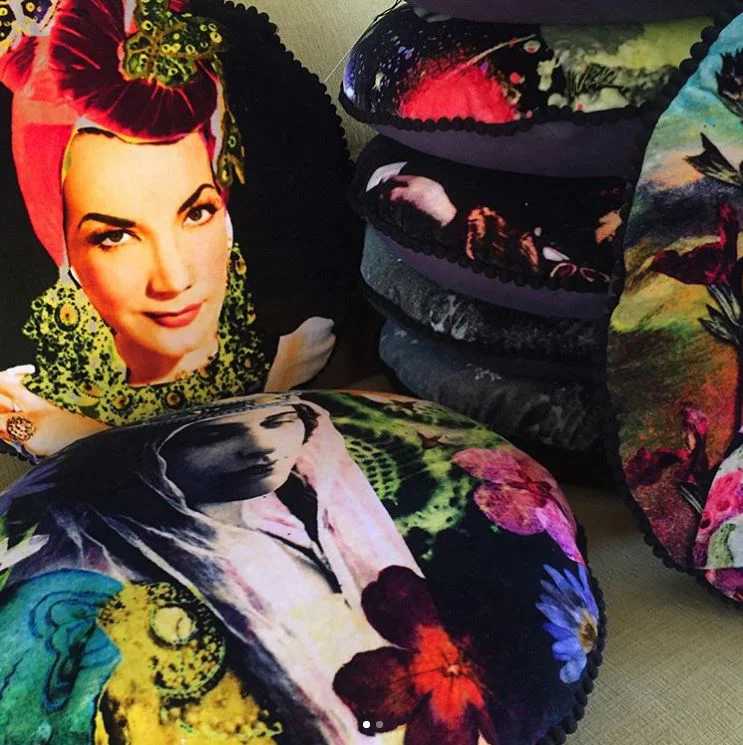Spotlight on Also Home
Today on the blog, I'm Spotlighting on Also Home, whose linen tablecloth featured recently on a styling shoot I did for Heinz. Anna and her team sell beautiful homewares and the quality is simply amazing. But this is one journey that has not been without its ups and downs, and the strength and belief of Anna has been incredible. recession, becoming a single mum, everything that the environment could possibly throw at Anna, has happened and yet her business is growing from strength to strength.
Read on to find out about her inspiring journey and if you want to shop you can through the button below.
Introduction
As a child, Anna Schmidt had always loved colour, texture and fabrics. She remembers telling her father that she longed to be a fashion designer and the concern on his face as he imagined his daughter struggling to make a name for herself in such a tough industry. This probably wasn’t helped when she failed her AS Level in Textiles.
Not one to be deterred, Anna persisted and joined Winchester School of Art to study Fashion & Textiles, where she found a real passion for textiles, quickly dropping the fashion side of the course to focus purely on textiles for interiors. At her degree show Anna was hired by Tigerprint London to design cards and gift wrap for some of the UK’s biggest highstreets retailers.
In 1999 Anna started designing bedlinen and soft furnishing for Delbanco Meyer. She stayed there for 5 years before taking a role as Design Director for Faupel Home Furnishings where she met “the dream team”, Paul Starbuck and Barry Drennan who both later joined her at ALSO Home.
In 2008, just as the recession hit, Anna’s vision and desire to create her own brand came to the forefront. She had travelled the world for work and saw a gap in the market for stylish homewares that were uniquely made by artisans from the countries she had visited. As the credit crunch took many businesses, Anna Leisa Schmidt Originals (A.L.S.O Home) was born. Anna kept going with the business and started working with some of the largest retailers in the UK, creating and producing their Own Label ranges for them. The team expanded with Paul joining and with their joint knowledge, experience and passion, ALSO Home grew.
1. What was the reason behind you starting your business?
I was working as Design Director for a well known home furnishing business and was lucky enough to do a lot of travelling for this role. I saw a gap in the market for stylish homewares that were uniquely made my artisans from the countries I had visited – not the products brought off the shelf that I would see a lot of in different shops. The vision and desire to create my own brand (‘ALSO’ in ALSO Home stands for Anna Leisa Schmidt Originals) came from that point.
2. How did you start up?, kitchen table? Mum’s garage, renting premises?
I started from a shed in the garden! I would design from there, then would keep all the stock in the spare room at the house. Every day TNT would drop round and I would frantically be running from the shed to the spare room to get it all shipped out. Kept me fit!
3. How did you fund your business?
The business started with £30k from the remortage of the house. It’s been funded from my own pocket and profits since!
4. What was the most difficult part of starting up your business? Access to money, advice, finding people to buy, marketing etc?
Well, I certainly had my challenges! Firstly the brand launched in 2008, just as the recession hit. I’ve read somewhere since, that if you started a business during the recession, you get used to working in the worst econocmic conditions and if you can make it a success then, you can do anything – I’m really proud we survived. Another huge personal challenge was that I became a single mum when my son was 11 weeks old. Not wanting to give up on the business, I would travel with my son around the world to meet with clients and would feed him while watching artisans at work or during meetings. I had a small but really experienced team in place who really stepped up this time, with workload but also emotional support. The business wouldn’t be around without them.
5. What help was missing for you?
If I’m honest, I was really disappointed and still am with the support we get from the bank. I’ve found greater support from outside of the bank through other financial institutions.
6. What went wrong in your first year? Few months if you haven’t been trading that long?
Oh quite a lot! Housing market crashed, marriage did similar! Customers were nervous buying. What I hadn’t accounted for was having money set aside for the second season. In my mind the customers buying would fund the second season but when that wasn’t happening how I intended I needed to work out a plan B.
7. What have you learnt?
To trust my gut. I always used to trust agencies and factories implicitaly but after having my fingers burnt so many times I’ve realised that no matter what the sales shpiel is, only me and the team are turely looking out for the brand. I’ve also learnt to take risks, but always calculated risks.
8. What is the most important piece of advice that you could give others thinking about starting a business?
Don’t do it! (JOKING!) Taking the first step is often harder than the actual doing day to day. Work out what you need to invest and double it at least.
9. And what do you enjoy the most?
I love being my own boss and the flexibility that gives me for family life. I’m privileged to have an incredible team behind me who I genuinely enjoy working with. The pinch me moments always bring me joy, sourcing and travelling around the world to create something that I then see in someones home.
10. On a scale of 1-10 how hard do you find it to run your own business?
Depends whats going on at that moment. Sometimes it’s a 2 and other times it’s an 8!
Nicola Says "Surviving an economic downturn, especially when you have just started a business tales tenacity. If you throw in the breakdown of a marriage and becoming a single Mum I suspect most of us would simply throw in the towel at this point, but not Anna.
"Housing market crashed, marriage did similar! Customers were nervous buying. What I hadn’t accounted for was having money set aside for the second season. In my mind the customers buying would fund the second season but when that wasn’t happening how I intended I needed to work out a plan B. " Sound advice indeed, always have a back up plan because you can't predict what will happen, and you certainly can't control it all."
The Girl with The Green Sofa
















